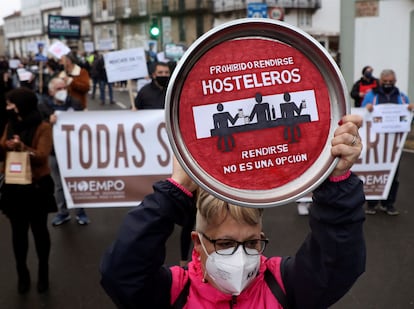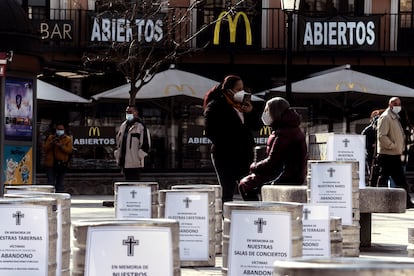In Spain, just one in 12 businesses will benefit from coronavirus direct aid
The government has set restrictive criteria for accessing €7 billion in non-refundable payouts to compensate for the loss of revenue after a year of the pandemic

Just one in 12 businesses will be eligible for the direct aid approved by the Spanish government to compensate for the effects of the coronavirus crisis.
Earlier this month, the executive greenlighted a €11-billion economic relief package that includes €7 billion in direct aid. This kind of non-refundable payout had been a longstanding demand by small and medium companies in Spain, where the crisis has hit the tourism and retail industries hard.
But an estimate made by EL PAÍS using data from the Tax Agency, the employers association CEOE and the credit risk management company Axesor, indicates that only around 180,000 businesses, out of 2.2 million currently operating in Spain, will be able to request a share of this aid, which is aimed at helping distressed companies cover fixed costs such as rent or supplies.
An analysis of the figures shows that some groups that have sustained major losses will be left out of the relief package
This is because the government – which is run by a coalition of the Socialist Party (PSOE) in partnership with the leftist Unidas Podemos – has focused the funds on sectors that applied in significant numbers for the ERTE job retention scheme. In other words, it is concentrating on saving jobs and preventing a cascade of corporate closures that would have a high impact on employment once these schemes are phased out. The government is also aiming to help out firms that were viable before the coronavirus crisis hit, rather than support businesses that were already failing before the pandemic.
How quickly this aid will be channeled to recipients is another issue that is up in the air. The fact that the funds will first go through regional governments could mean that applicants will not see any money before the summer. And regional authorities are already asking the central government for changes to ensure they are not overwhelmed by the effort of operating the aid program.
The conditions for eligibility are restrictive: only 95 out of 538 existing activities, following the Tax Agency’s classification, may file for the aid. These range from taxi drivers and bakers to campsites and betting parlors. In absolute numbers, that means that 355,713 registered companies out of 2.2 million could be eligible. To this figure must be added 397,281 self-employed workers out of a total of 1.3 million, according to Axesor.

But these potential recipients must additionally have had positive earnings in 2019, a condition that fewer than half meet, according to Tax Agency statistics. This brings down the pool of eligible companies to one out of every 12. As for the self-employed, those who pay their taxes under the módulos system – where taxes are paid according to predicted rates for their sector, rather than having to present records of all their earnings – will receive a fixed amount regardless of their 2019 earnings.
And there is an additional requirement: recipients must prove that they suffered at least a 30% drop in revenues in 2020. According to figures offered by CEOE based on estimates by the National Statistics Institute (INE), only five out of over 80 economic sectors can claim such falls. These are travel agencies (-75% for combined losses of around €19 billion), accommodation (-68% or €18.6 billion), air travel (-60% or €8 billion), the food and drink industry (-43% or €23.2 million) and the movie industry (-34% or €2.2 million).
Feeling left out
A group called the Retail and Hospitality Alliance on Thursday demanded that the government lower the threshold from 30% to 15%. The CEOE wants the aid to focus on individual businesses rather than on sectors. And regional governments complain that some of their own most important sectors are being left out.
An analysis of the figures shows that some groups that have sustained major losses will be left out of the relief package. These include automobile sale and repair establishments, with a 19% drop in revenues (around €17.5 billion), construction (11% or €17.2 billion), automakers (11% or €8.1 million), metal works manufacturers (14% or €5.5 billion), and the advertising and marketing industry (17% or €3.5 billion).
A further condition is that applicants must remain in operation until June 2022 – an attempt to prevent so-called “zombie companies” from collecting aid and shutting down soon later.
The ratings company S&P said in a report that it is still too early to know how many companies will be saved with these measures, but that they will help some businesses survive the pandemic, contribute to the recovery, “and ultimately help banks contain their credit losses.”
“The aid will contribute to sharing out a burden that is being overwhelmingly borne by a few specific sectors,” said Ángel de la Fuente, executive director of Fedea, an applied economics research group.
There are some indications that the government’s €11-billion rescue package will fall short. The Bank of Spain had been hoping to see more than €20 billion, and for most of this money to be used to eliminate debt instead of compensating for revenue losses. Meanwhile, corporate debt has reached around €50 billion, and in late 2021 there will still be a €50 billion shortfall in Spain’s gross domestic product (GDP).
English version by Susana Urra.
Tu suscripción se está usando en otro dispositivo
¿Quieres añadir otro usuario a tu suscripción?
Si continúas leyendo en este dispositivo, no se podrá leer en el otro.
FlechaTu suscripción se está usando en otro dispositivo y solo puedes acceder a EL PAÍS desde un dispositivo a la vez.
Si quieres compartir tu cuenta, cambia tu suscripción a la modalidad Premium, así podrás añadir otro usuario. Cada uno accederá con su propia cuenta de email, lo que os permitirá personalizar vuestra experiencia en EL PAÍS.
¿Tienes una suscripción de empresa? Accede aquí para contratar más cuentas.
En el caso de no saber quién está usando tu cuenta, te recomendamos cambiar tu contraseña aquí.
Si decides continuar compartiendo tu cuenta, este mensaje se mostrará en tu dispositivo y en el de la otra persona que está usando tu cuenta de forma indefinida, afectando a tu experiencia de lectura. Puedes consultar aquí los términos y condiciones de la suscripción digital.









































